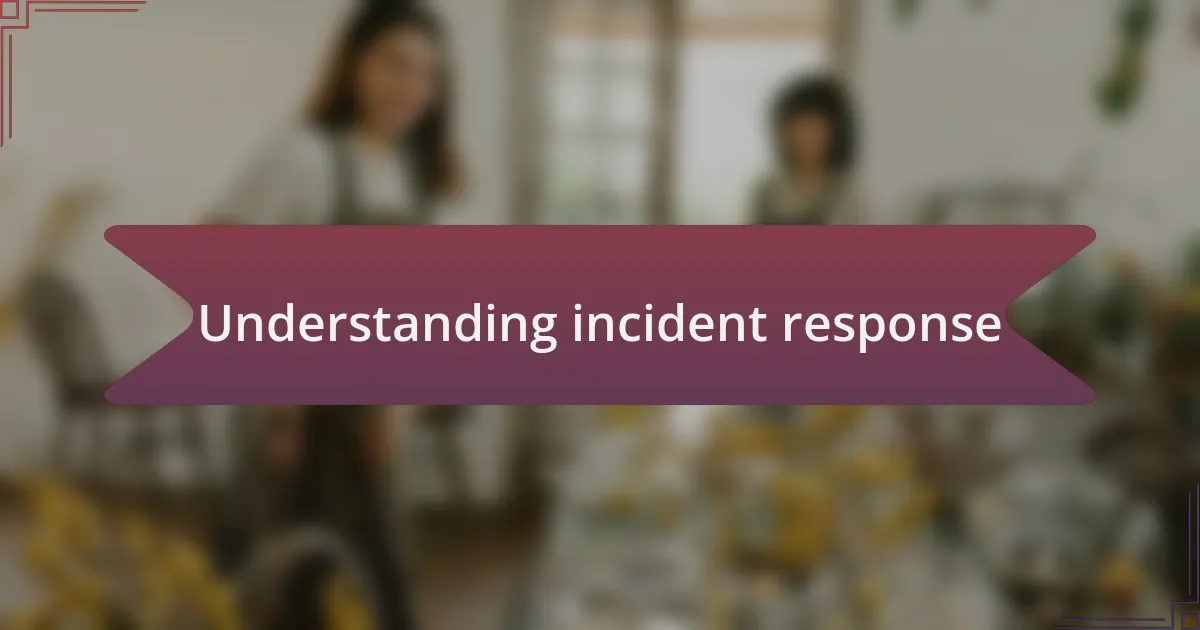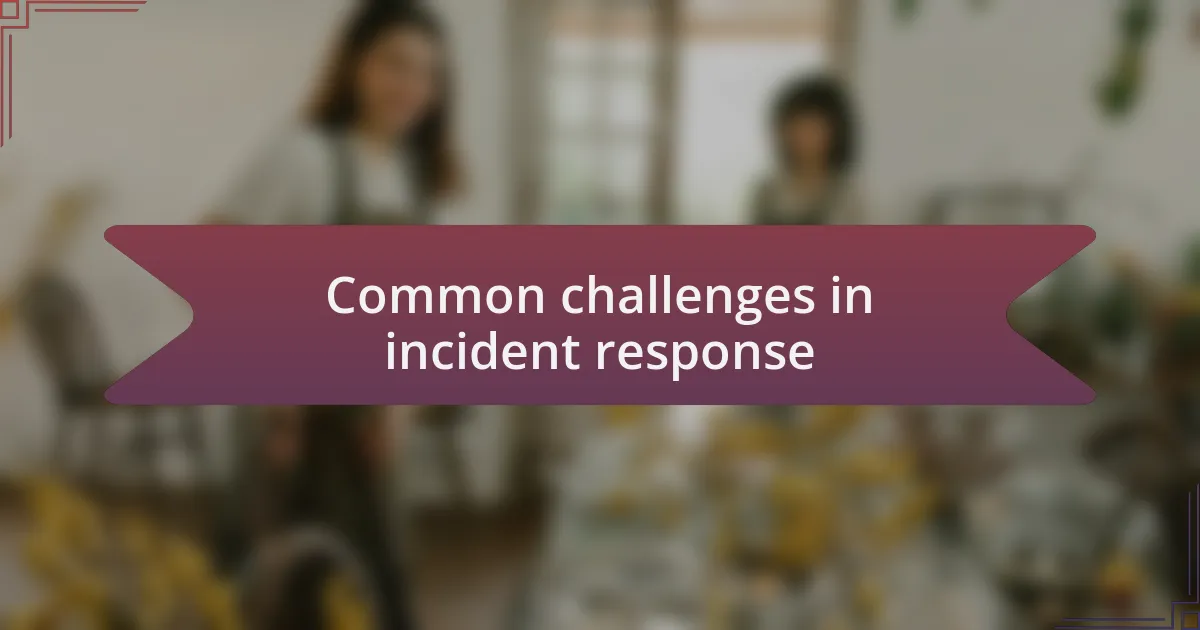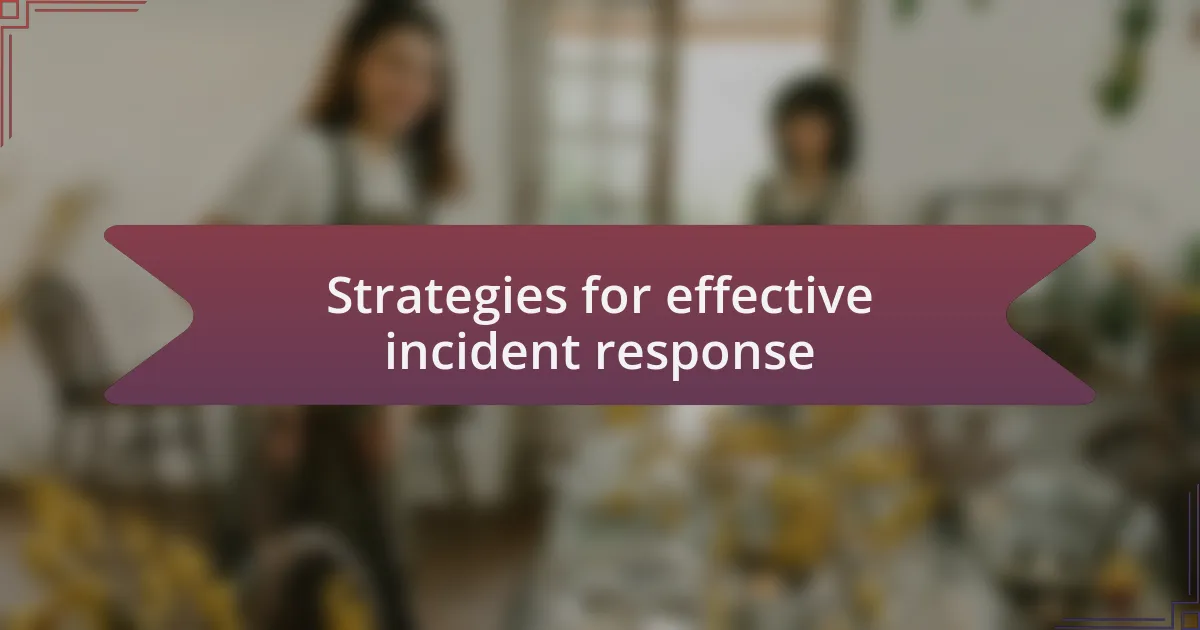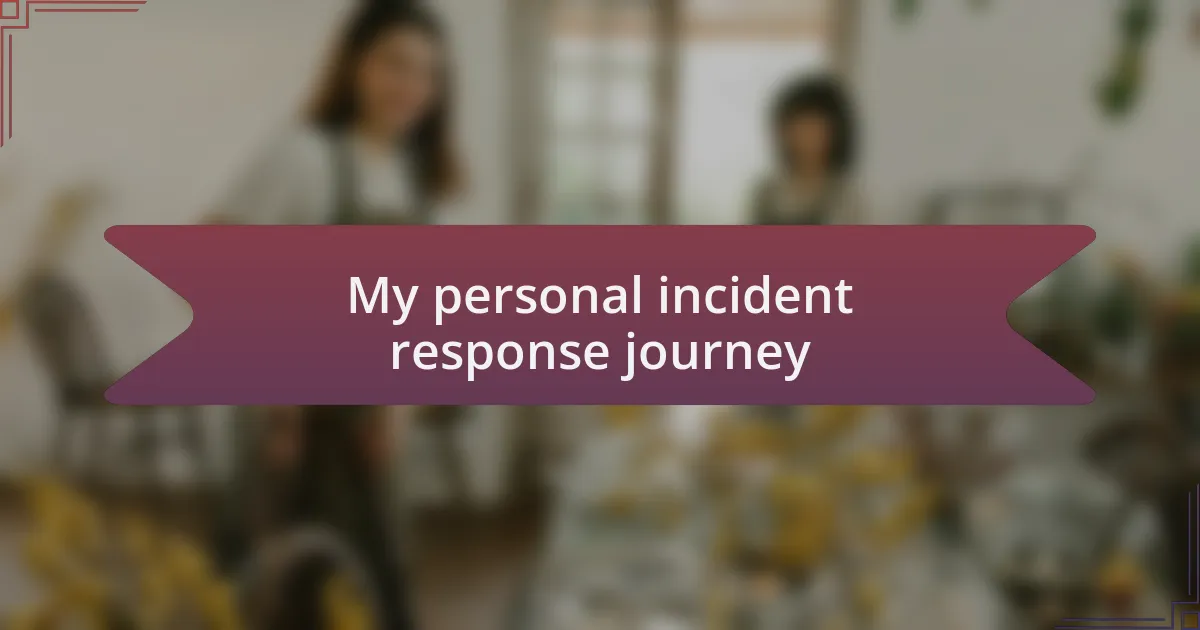Key takeaways:
- Effective incident response relies on clear communication, defined roles, and a proactive approach to risk management.
- Implementing post-incident reviews and continuous training enhances team preparedness and response effectiveness.
- Emotional support and empathy within the team are crucial for maintaining morale during high-stress incidents.

Understanding incident response
Understanding incident response is crucial for maintaining the integrity of any software system. When I first encountered a significant incident, I realized that an effective response wasn’t just about putting out fires; it involved a systematic approach to identifying and mitigating risks. Have you ever sat in a meeting discussing what went wrong, only to realize that the real challenge was in our lack of preparation?
In my experience, the heart of incident response lies in clear communication and defined roles. I remember a situation where our team faced a critical server outage. The chaos could have spiraled out of control, but because we had established a response plan with everyone knowing their responsibilities, we managed to restore service efficiently. How do you foster a culture of shared responsibility in your team?
Moreover, having a robust logging and monitoring system set up has completely transformed my approach to incident response. After implementing these tools, I found that I could often detect issues before they escalated into full-blown incidents. Isn’t it empowering to transition from a reactive to a proactive mindset?

Common challenges in incident response
One major challenge in incident response is the overwhelming volume of alerts that can cloud your judgment during a crisis. I recall a time when our monitoring system was so noisy that legitimate alarms got lost in a sea of false positives. It felt like being in a crowded room, shouting for attention, yet no one could hear you. How can we streamline alerts to focus on what’s truly important?
Another hurdle I’ve faced is the gap in knowledge among team members during an incident. In one instance, a junior developer froze under pressure as we attempted to diagnose a complex bug. This experience taught me the importance of cross-training and ensuring that everyone, regardless of their role, understands the essential aspects of incident response. Haven’t we all wished for a few more hands on deck when things get chaotic?
Finally, the pressure to quickly resolve incidents can lead to hasty decisions that might not address the root cause. I’ve experienced situations where a quick fix felt satisfying, yet we paid for it later with recurring issues. This brings up an important consideration: how do we balance the urgency of incident management with the need for thorough investigation and improvement?

Strategies for effective incident response
One effective strategy I’ve found is implementing a clear communication protocol during incidents. In a recent situation, our team used a dedicated chat channel to streamline updates and decisions, which helped keep everyone on the same page. It reminded me how crucial it is to establish trust and open dialogue; without it, team members might hold back valuable insights while problems escalate.
Additionally, conducting regular post-incident reviews can significantly enhance future responses. I remember after a particularly challenging outage, we gathered to dissect our actions. This debriefing allowed us to extract lessons learned and mitigate similar issues down the line. What’s more empowering than transforming a negative experience into a foundation for growth?
Lastly, I’ve seen immense value in integrating automated tools that help prioritize alerts based on severity. Early in my career, I relied solely on manual triage—and it was chaotic. Now, using smart filters, I can focus on critical incidents without feeling overwhelmed. Isn’t it essential to leverage technology to empower our decision-making rather than hinder it?

My personal incident response journey
Every incident response I’ve navigated has shaped my approach in profound ways. One memorable incident occurred during a high-traffic launch when our server unexpectedly crashed. I felt a surge of panic, but leading the team to quickly diagnose the issue taught me that calmness and clarity are essential. I realized how easy it is to succumb to stress during crises, but keeping a level head can make all the difference.
Reflecting on my evolution, I’ve embraced the idea that preparation is key. In one instance, we faced a phishing attack that caught us off guard. I remember the frustration of scrambling to contain the damage. Afterward, we developed comprehensive training sessions for the team. That experience reinforced my belief that knowledge empowers us; it creates a bulletproof shield against future threats. How can anyone feel secure without understanding the risks?
Throughout my journey, I’ve discovered that collaboration goes beyond just teamwork during an incident. I recall a time when we had to engage external stakeholders due to a data breach. It was daunting, but it emphasized the importance of building relationships ahead of time. By fostering this network, I learned that we are not isolated in these challenges; we can rely on our connections to bolster our response efforts. Isn’t it reassuring to know that support is just a conversation away?

Lessons learned from my experience
One of the most significant lessons I learned is the value of post-incident reviews. There was an incident where our application faced severe downtime, resulting in frustrated users and lost revenue. After the dust settled, we gathered to dissect what happened. I realized that examining our response not only highlighted our weaknesses but also celebrated our successes. It’s fascinating how reflection can transform a setback into a stepping stone for growth, isn’t it?
Another crucial takeaway was the importance of adapting your response plan based on previous experiences. I remember implementing a change management protocol after a simple server update led to unexpected outages. That moment made me realize that flexibility in our protocols is vital; what works in one scenario may fail in another. Have you ever noticed how rigid plans can blind us to better solutions?
Lastly, I’ve come to appreciate the emotional toll that incidents can take on a team. During a particularly stressful security breach, I observed how team morale dipped significantly. It drove home the point that supporting each other isn’t just important for productivity; it’s essential for safeguarding mental health. How can we better support our teams? I believe fostering a culture of empathy and open communication is key.